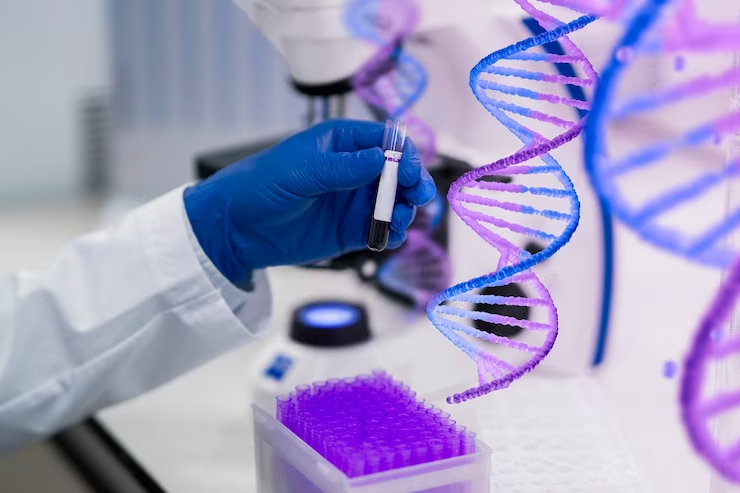
In today’s era of oncology, germline genetic testing has emerged as a pivotal tool in unravelling the mysteries of hereditary cancer syndromes, guiding treatment pathways, and mitigating future cancer risks. As technology advances and awareness grows, the role of genetic testing becomes increasingly prominent. A blood test for cancer may reveal actual cancer cells, but a blood test to detect cancer may not be sufficient to diagnose cancer and would require other tests. This article aims to delve into the nuanced realm of genetic testing, exploring its indications, common hereditary cancer syndromes, and the indispensable role of genetic counselling in managing these conditions.
Understanding Germline Testing in Cancer Patients:
The distinction between somatic and germline variants holds paramount importance in cancer diagnosis and management. While biomarker tests offer insights into tumors mutations, discerning germline status becomes imperative for comprehensive treatment strategies and familial risk assessment. Notably, not all biomarker tests possess the capability to differentiate between somatic and germline variants. Hence, meticulous evaluation of test results alongside patient-specific factors becomes pivotal in determining the necessity for germline testing.
Indications for Germline Testing in Oncology:
Germline testing assumes a pivotal role in the diagnostic journey of patients afflicted with various malignancies. As per the NCCN Clinical Practice Guidelines in Oncology (NCCN Guidelines®), it is recommended to incorporate germline testing into the evaluation process for individuals diagnosed with ovarian, breast, pancreatic, prostate, colon, or other cancer types. This proactive approach aids in deciphering underlying hereditary factors contributing to cancer predisposition and allows for tailored treatment strategies.
Unveiling Hereditary Cancer Syndromes:
The landscape of hereditary cancer syndromes encompasses a diverse array of genetic aberrations, each contributing to an elevated risk of specific malignancies. Understanding these syndromes is instrumental in facilitating personalized risk assessment, implementing vigilant surveillance protocols, and devising targeted risk reduction strategies.
Hereditary Breast and Ovarian Cancer (HBOC) Syndrome:
- HBOC syndrome, primarily associated with mutations in the BRCA1 or BRCA2 genes, heralds heightened susceptibility to breast, ovarian, fallopian tube, peritoneal, male breast, pancreatic, and prostate cancers. It helps to be aware of hereditary breast cancer symptoms to facilitate early detection and treatment. The identification of BRCA mutations underscores the importance of genetic counselling in elucidating personalized risk profiles and guiding informed decision-making regarding surveillance and risk mitigation strategies.
Lynch Syndrome (Hereditary Non-Polyposis Colorectal Cancer):
- Lynch syndrome, characterized by an increased predisposition to colorectal, endometrial, ovarian, stomach, small intestine, pancreatic, kidney, brain, skin, breast, prostate, ureter, and bile duct cancers, necessitates meticulous genetic evaluation. Identification of Lynch syndrome-linked mutations facilitates early detection efforts and empowers individuals to adopt proactive measures to mitigate their cancer risk.
Li-Fraumeni Syndrome:
- Li-Fraumeni syndrome, rare yet formidable, elevates the risk of sarcoma, leukemia, brain cancers, adrenal cortex cancer, and breast cancer. Driven by mutations in the TP53 gene, this syndrome underscores the importance of genetic testing and early cancer screening in high-risk individuals.
Familial Adenomatous Polyposis (FAP):
- Familial Adenomatous Polyposis (FAP), characterized by the development of numerous adenomatous colon polyps, significantly escalates the risk of colorectal cancer. Additionally, individuals with FAP face heightened susceptibility to cancers affecting various organs, including the stomach, small intestine, pancreas, and biliary tree. Early intervention and diligent surveillance are paramount in managing FAP and mitigating cancer-related morbidity and mortality.
The Crucial Role of Genetic Counselling: Is cancer a hereditary disease?
Genetic counselling serves as the cornerstone of comprehensive cancer care, offering a multifaceted approach to risk assessment, decision-making support, and psychosocial well-being.
Risk Assessment:
- Is Cancer hereditary or not is a question that everyone wants an answer to. Genetic counsellors employ a holistic approach to evaluate an individual’s risk for hereditary cancer syndromes, integrating personal and family medical histories with genetic testing results to elucidate personalized risk profiles.
Informed Decision-Making:
- Armed with comprehensive risk assessments, individuals are empowered to make informed decisions regarding genetic testing, cancer screening protocols, and risk reduction strategies, aligning with their personal preferences and values.
Understanding Genetic Test Results:
- Genetic counsellors play a pivotal role in elucidating the nuances of genetic test results, translating complex genetic findings into understandable information, and delineating their implications for cancer risk and management.
Family Planning:
- Genetic counselling provides individuals with invaluable insights into familial cancer risks, facilitating discussions about family planning and the transmission of hereditary cancer predispositions to future generations.
Psychosocial Support:
- Beyond clinical considerations, genetic counsellors offer empathetic support and guidance to individuals grappling with the psychological and emotional ramifications of genetic testing and cancer risk.
Healthcare Coordination:
- Genetic counsellors collaborate closely with multidisciplinary healthcare teams to ensure seamless coordination of care, facilitating the implementation of personalized surveillance protocols and risk reduction interventions.
In essence, genetic testing serves as a beacon of hope in the realm of oncology, offering invaluable insights into hereditary cancer predispositions and empowering individuals to take proactive steps towards cancer prevention and management. By leveraging the collective expertise of genetic counsellors, healthcare providers can navigate the complexities of hereditary cancer syndromes with precision and compassion, ultimately optimizing patient outcomes and quality of life.
